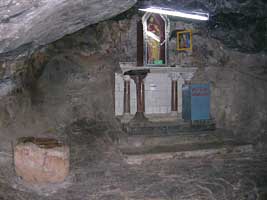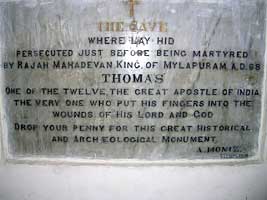

![]()
![]()
|
Newsletter of the District of Asia Jan - June 2005 St.
Alphonsus Liguori
As regards my opinions concerning the present state of the church with relation to the election of the new Pope, what opinion of any weight could a miserable, ignorant, and unspiritual person like myself possibly give? There is need for prayer and much prayer. All the human science and prudence that there is cannot extricate the church from the present state of relaxation and confusion in which every section finds itself; the all-powerful arm of God is necessary As regards the bishops, very few of them possess genuine zeal for souls. Almost all religious communities - and one could omit the "almost"- are relaxed. As a result of the present state of general confusion, observance has collapsed and obedience is a thing of the past. The state of the secular clergy is still worse: so, in a word, there is a need for a general reform of all clerics and ecclesiastics if there is to be any improvement in the present great corruption of morals among the laity. So we have to pray to Jesus Christ that he would give us as head of the Church one possessed of more spirit and zeal for the glory of God than of learning and human prudence. He should be free of all party attachments and devoid of human respect. If, by chance, for our great misfortune, we should get a Pope that does not have the glory of God as his sole purpose, the Lord will not help him greatly and things from their present condition will go from bad to worse. However, prayer, which can provide a remedy for so many present ills, will move the Lord to put his hand to the problem and remedy the situation. For this reason I have not only instructed all the communities of my humble Congregation to pray to God with greater fervor than ever for the election of the new Pontiff, but I have also instructed all the priests of my diocese, both secular and religious, to recite the prayer pro electione Pontificis in all Masses. I also hope that the Lord will inspire the Sacred College of Cardinals to instruct Papal Nuncios throughout the whole Christian world to see to it that this prayer is recited by every priest at Mass. This is the first advice that a miserable old man like myself can give. I shall not omit to pray several times each day for the election of the Pope but what use will my frigid prayers be? Nevertheless, I trust in the merits of Jesus Christ and Our Lady that, before my death, which is now quite near on account of my years and the infirmities which afflict me, the Lord will grant me the consolation of seeing the church restored. [Note: In fact, Saint Alphonsus would live another 13 years. Ed.] I assure you, my friends, that I desire, like yourself, to see remedies for so many and such unfortunate situations. In all this matter a thousand ideas circulate in my head which I feel like telling everybody about. But, mindful of my own unworthiness, I have not the effrontery to publicize them lest I should appear to wish to reform the whole world. So I share these ideas with you not from any arrogance but for my own peace of mind. Since there are many vacancies in the College of Cardinals, I would hope, in the first place, that the new Pope would select as cardinals from among the candidates proposed to him only the most learned and zealous for the good of the Church. He should convey to the princes of the various countries in the very first letter announcing his election that when they wish to nominate candidates to be promoted as cardinals they should propose only those of proven piety and learning. Otherwise, he could not in conscience promote them. I should like to see the new Pope being determined to refuse further benefices to those in the Church who are already well provided for in this respect with sufficient income for their appropriate maintenance. In this matter I should like to see him standing firm against all efforts to the contrary. I wish that he would control the extravagance of all prelates. For this purpose he should determine precisely for everybody (otherwise there will be no remedy in this matter) the exact number of their retainers in accordance with what is appropriate for the different groups of prelates: so many butlers and no more; so many servants and no more; so many horses and no more. That will ensure that the enemies of the Church will have no further reasons for their criticism. The new Pope should be vigilant to confer benefices only on those who have loyally served the Church and not just anybody indiscriminately. He should use particular diligence in this choice of bishops since it is on them that the service of God and the salvation of souls mainly depends. He should pay great attention to informing himself beforehand about their moral conduct and their leaning, both of which are necessary for the good government of their dioceses. And as regards those bishops already in their dioceses, he should inform himself secretly from the metropolitans and others about their conduct, to ascertain if they are paying little attention to the good of their flock. I wish, furthermore, that he would let it be known to all and sundry bishops who are careless in their duties, who transgress in the matter of residence or in the luxury of their retinue or in excessive expenditure on furnishings, life-style, and similar matters, will be suspended or replaced by the appointment of vicars apostolic in order to remedy the situation. It is important to make an example from time to time. Examples of this sort will make other bishops take notice and moderate their extravagance accordingly. I hope that the next Pope will be very slow in granting privileges which weaken good discipline in religious life. Such, for example, would be permission for enclosed sisters to leave the enclosure out of mere curiosity just to see the things of the world, readily to dispense from their vows and allow them to return to secular life - a practice from which many scandals result. Above all else I should hope that the Pope would be able to recall all religious to their primitive observances, at least in the most important matters. That is all for now; I do not wish to bore you further. We can do nothing more than pray to the Lord that he will give us a Shepherd full of His Spirit, one who will be able to deal with the matters I have mentioned here briefly and all for the glory of Jesus Christ. Accept my deep respects as I declare myself your Excellency's devoted and humble servant. Alfonso
Maria, bishop of St. Agatha of the Goths.
|
||||

